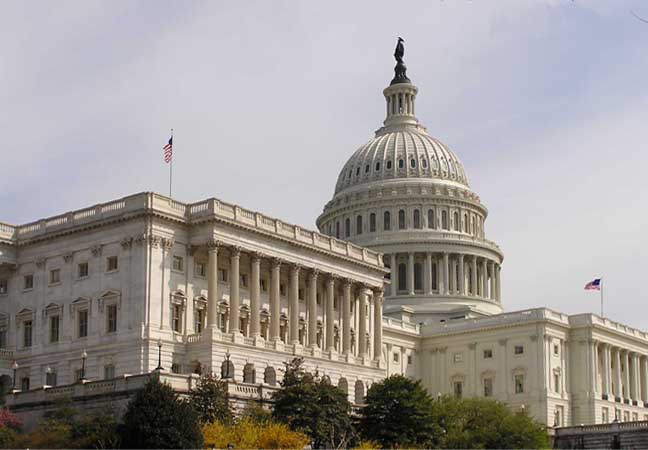The American Institute of Architects today released a letter from more than 350 different associations and companies expressing opposition to efforts by special interests to gut energy conservation requirements for federal buildings.
The letter, which is addressed to Energy and Natural Resources Chairman Ron Wyden, D-Ore., and ranking Republican Lisa Murkowski of Alaska, was released one week ahead of the scheduled mark-up of the Energy Savings and Industrial Competitiveness Act by the Senate Energy and Natural Resources Committee May 8.
You can see this press release online here: http://www.aia.org/press/releases/AIAB098645
That legislation, introduced by Senators Jeanne Shaheen (D-N.H.) and Rob Portman (R-Ohio), would promote greater use of energy efficiency technology in commercial and residential buildings and by manufacturers.
However, efforts by special interests to weaken energy conservation requirements for federal buildings are likely to surface during the mark-up. In particular, an amendment is expected to be offered that may weaken or eliminate Section 433(a) of the Energy Independence and Security Act (EISA). The 2007 law requires federal agencies to phase out the consumption of energy from greenhouse-gas-emitting sources in newly constructed or renovated federal buildings by 2030, unless they can show such reductions are not technically feasible.
“According to the Department of Energy’s Energy Information Administration,’’ the letter states, “the building sector accounts for 39 percent of total U.S. energy consumption, more than both the transportation and industry sectors. The same study found that buildings are responsible for 71 percent of U.S. electricity consumption and that buildings in the United States alone account for 9.8 percent of carbon dioxide emissions worldwide.
“Weakening or repealing federal building energy policies will dramatically harm the federal government’s ability to design and build facilities that use less energy, save taxpayers money, and protect the environment,” the letter concludes. “Therefore, we urge you to oppose efforts to weaken the energy consumption and GHG emission requirements of EISA Sec. 433(a) and other important energy-saving policies.”
A full text of the letter can be found here. A “Myth vs. Fact” document about Section 433 of EISA can be found here.
About The American Institute of Architects
Founded in 1857, members of the American Institute of Architects consistently work to create more valuable, healthy, secure, and sustainable buildings, neighborhoods, and communities. Through nearly 300 state and local chapters, the AIA advocates for public policies that promote economic vitality and public well being. Members adhere to a code of ethics and conduct to ensure the highest professional standards. The AIA provides members with tools and resources to assist them in their careers and business as well as engaging civic and government leaders, and the public to find solutions to pressing issues facing our communities, institutions, nation and world. Visit www.aia.org.
Related Stories
| Aug 11, 2010
High-profit design firms invest in in-house training
Forty-three percent of high-profit architecture, engineering, and environmental consulting firms have in-house training staff, according to a study by ZweigWhite. The 2008-2009 Successful Firm Survey reports that only 36% of firms overall have in-house training staff. In addition, 52% of high-profit firms use an online training system or service.
| Aug 11, 2010
Help Wanted: Architect for $100 million 'Discovery Park' in Union City, Tennessee
The Robert E. and Jenny D. Kirkland Foundation is identifying architects interested in designing a 50-acre, multi-million dollar complex in Union City, TN. Discovery Park of America will be a world-class, multi-faceted venue presenting exhibits and interactive experiences about history, nature, art, and science.
| Aug 11, 2010
Report: Fraud levels fall for construction industry, but companies still losing $6.4 million on average
The global construction, engineering and infrastructure industry saw a significant decline in fraud activity with companies losing an average of $6.4 million over the last three years, according to the latest edition of the Kroll Annual Global Fraud Report, released today at the Association of Corporate Counsel’s 2009 Annual Meeting in Boston. This new figure represents less than half of last year’s amount of $14.2 million.
| Aug 11, 2010
AIA to Congress: Act now to jump start building sector of economy
Tampa-based architect, Mickey Jacob, FAIA, unveiled the American Institute of Architects’ (AIA) Rebuild & Renew plan for both short- and long-term economic recovery to the House Committee on Small Business at a hearing October 7th.
| Aug 11, 2010
National Intrepid Center of Excellence tops out at Walter Reed
SmithGroup and The Intrepid Fallen Heroes Fund (IFHF), a non-profit organization supporting the men and women of the United States Armed Forces and their families, celebrated the overall structural completion of the National Intrepid Center of Excellence (NICoE), an advanced facility dedicated to research, diagnosis and treatment of military personnel and veterans suffering from traumatic brain injury.
| Aug 11, 2010
Jacobs, HDR top BD+C's ranking of the nation's 100 largest institutional building design firms
A ranking of the Top 100 Institutional Design Firms based on Building Design+Construction's 2009 Giants 300 survey. For more Giants 300 rankings, visit http://www.BDCnetwork.com/Giants
| Aug 11, 2010
Walt Disney Family Museum planned in San Francisco
Construction is under way on a new museum dedicated to the man behind the Disney empire. Set to open this fall in San Francisco, the Walt Disney Family Museum will feature 10 galleries, starting with Disney's beginnings on a Missouri farm.







